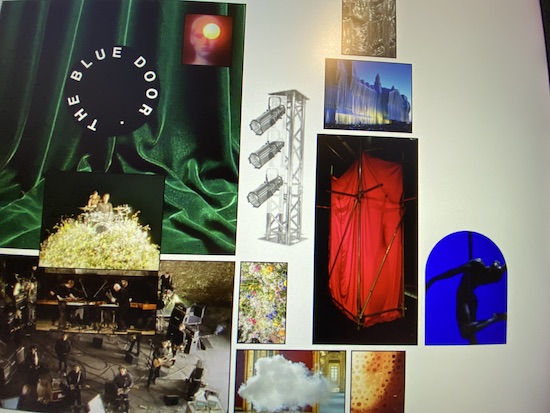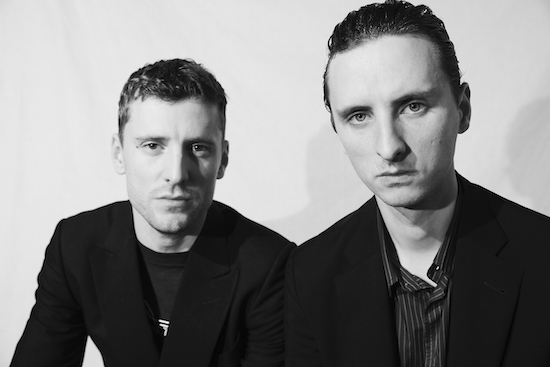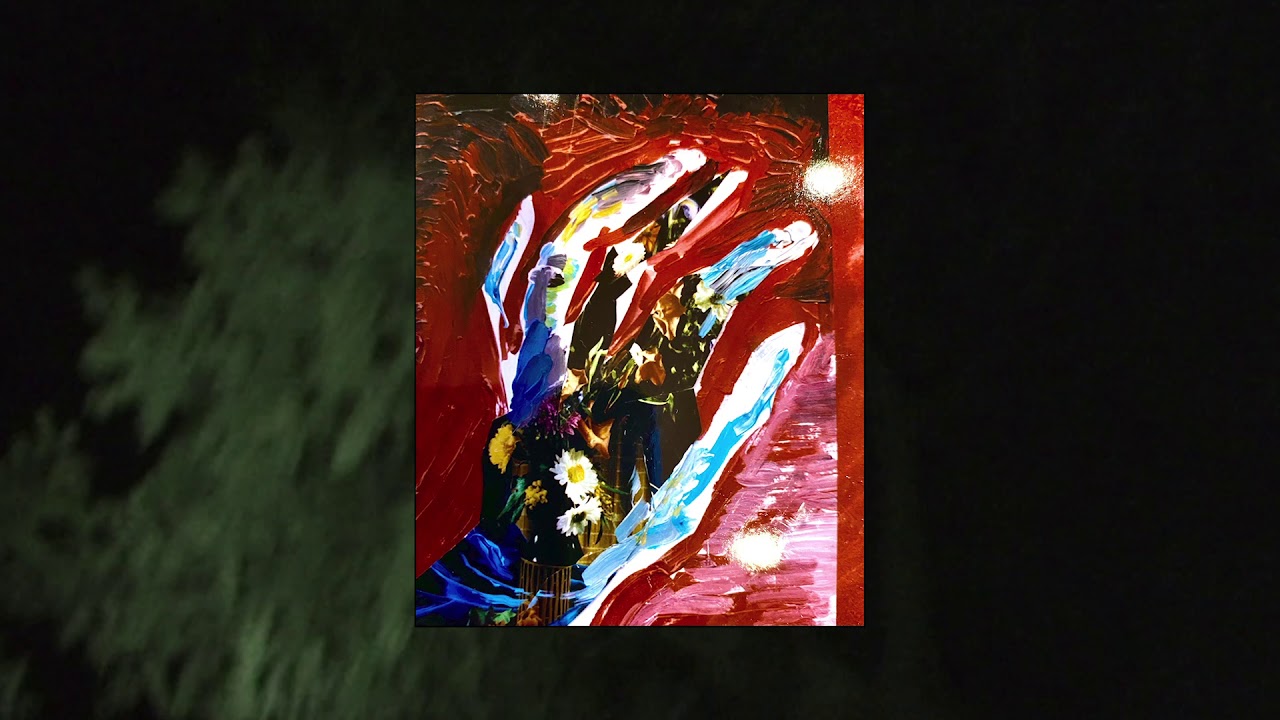“There’s a good balance between the brutal stuff…” says Jack Barnett "…and the beautiful bits" adds George, completing his twin brother’s sentence for him. The duo have come to a Leyton pub to discuss their plans for The Blue Door, their forthcoming Barbican concert that’ll a follow-up to the Expanded concert that took place at the same venue in 2014. These New Puritans are in a time of consolidation. This week they release The Cut, an album-length collection of versions and outtakes from last year’s brilliant Inside The Rose album, including a sumptuous and previously-unheard track called ‘The Mirage’, constructed from the bones of a piece born in their mum’s chilly Southend loft during their earliest musical experiments. Back then, the twins would bunk off PE to clamber up a ladder, balance George’s drum kit on the small available space, and Jack would hang a microphone taken from a karaoke set over a beam to record it. Jack would then manipulate the recordings, wearing three coats as it was so cold. His jacket habit endures: "People think I’m being rude, that I’m about to leave," he says. "but I like to wear a coat when I’m working on music because it puts me back in that mindset".
So early 2020 finds the Barnett brothers in a curious position, loved by the likes of this publication and a hardcore of fans, but perhaps lacking the sort of acclaim their ambition and four deeply unique albums deserves. It perhaps says a lot about the beige conservatism of the Mercury Prize that TNPs have never had a nomination, given that they’re the sort of band who display the kind of borderline-commercial artistic endeavour that one always assumes that the award was set up to acknowledge. They are to the 2010s what Radiohead were to the 90s or Talk Talk the 80s, but as George says, “we’ve always been a cult band” – and Jack adds, “someone told me the other day that we’re the last cult band”.
Still, there’s work to be done. They’re halfway through preparing the Barbican show, where the ensemble will consist of brass, sopranos, percussionists, long-time collaborator Graham Sutton, Chris Hamilton and Hans-Henning Korb, who’ve been on the road with the brothers over the past year. They’ll be playing at least one song from each album as well as new music. "The idea is that rather than it being a classical gig or us with classical musicians, it’s one unclassifiable band, so there’s no separation between those different ways of playing,” Jack explains, “there’s no conductor, it’s just everyone playing together. The usual thing is you draft in someone to do arrangements, a bored orchestra turns up and scrapes away – in this the musical processes are more tied up together.”
The visual element of These New Puritans, largely George’s domain, has come to the fore in recent years, and at the Barbican will be explored in videos made by Daniel Askill, Angelo Pennetta and Harley Weir. The stage will be flanked by screens and scaffolding towers covered with gauze and filled with artwork by Freya Don. “She does these really delicate, fragile pieces of silk, hand-cut artwork and I put them in this really brutalist scaffold, behind curtains,” explains George, “It’s a hidden world that she’s created. There’ll be projections, and I’ve got these different cameras filming and tracking Jack".
The brothers have largely been working on their plans alone. "With a lot of live production it becomes ‘who’s got the biggest laser’ and it all looks the same, there’s no coherence to it,” Jack says, “with us it’s lots more handmade. You could make one light come on and off for one song, and that’s going to be more interesting than a thousand lasers spinning round. It’s more craft. People would think that these are big productions, but 99% of it comes down to me or George doing it ourselves. It’s DIY out of necessity, but also because it comes out better that way because it has conviction through it and it doesn’t get muddled or compromised.”

The Blue Door ideas collage
Perhaps not many think of These New Puritans as a DIY group. Their sound is far more opulent than you’d get from most groups who you’d associate with the acronym, yet self-sufficiency is an approach that stretches right back to those early years in the freezing Essex loft, trying to avoid stepping off a beam and plummeting into the bedroom below. They’ve come to the interview from their equipment lock-up where they’ll later spend their Friday night stock-taking merch. Some groups might have got tired of the effort it takes to keep the show on the road against the odds, but over the years I’ve noticed that as time has gone on Jack and George Barnett have seemed increasingly confident and at ease, both with each other and what These New Puritans means to them. With many bands you often get the impression that it wouldn’t really matter who was in the group, that it’s identikit music that might be rattled out with any bored collection of young people looking for something to do. In TNPs case, I’ve long felt that everything about their music and performances has an energy and focus that is mercurial and rare. George, for instance, doesn’t know how to play drums in any context outside the Puritans. Since the departure of Thomas Hein to become a neuroscientist a few years ago, what’s emerged is that everything stems from the balance between the twins, and their ability to join talents and forces to create something incredibly potent outside of themselves – These New Puritans as manifestation of a shared identity. From the outside, their relationship might appear to be a curious, contradictory one – George is married to Pixie Geldof, and the other year appeared in a <a href=”https://www.gq-magazine.co.uk/gallery/princess-eugenie-wedding-best-dressed-men
“target=”out”>GQ photo gallery of the best-dressed men at the wedding of Princess Eugenie, tenth in line to the British throne. Jack, meanwhile, spends time writing lyrics with David Tibet of Current 93. Yet are these Essex boys really so different?
Jack Barnett: It changes your whole personality, having a twin. You’re always with someone who’s verifying who you are and what you are, who knows you so well. The first time George wasn’t there all the time and I wasn’t in that situation was at Thurrock & Basildon Art College, where suddenly I would make stuff up and lie, because nobody knew who I was, so I could be anything at all.
GB [in a wary tone]: You did that?
JB: Yeah.
GB [in a sad tone]: I don’t like that. About what? I’m very objective, I want to find the reality of the situation, what matters. I’m just thinking about my childhood now. I always treat my interviews as therapy sessions, that’s my problem. People always think we’re massively different, but we’re much more alike, the more you get to know us.
JB: I’m not really sure about that…
GB: We’re like the grandfathers on either side.
JB: That’s very true. You’re like the mad one who fought in the Second World War.
GB: You know the picture with the man eating his lunch on a skyscraper beam in New York? He did that.
JB: His family were in dog racing in Walthamstow, he’d go around collecting the money. Once he was driving a car and a coach came past them and people were jeering, having a laugh, so he rammed the side of the coach. It comes screaming to a halt, he pulls the driver out, knocks him out – he was also a boxer – gets back in the car, and drives off. You’re more like him, George. The other one was a church organist.

Jack goes onto explain that the second grandad played the organ on Foulness, the Thames Estuary island that’s long been a restricted area due to its status as a weapons testing range. Jack and George’s grandad was one of few people with permission to access the island. This juxtaposition of music, beauty and violence in a landscape immediately makes me think of Field Of Reeds, These New Puritans’ 2013 masterpiece of rich composition and evocation of love in the Thames estuary. As I wrote before on tQ, I think I went a bit far into interpreting that record as a specifically Essex estuary piece, but how much influence has the county had on TNPs?
JB: The Essex thing is self-creation. It’s people building new cities, deciding how to live, and so it’s not got that Northern, socialist feeling. It’s finding your own way of doing things. I think you can hear that in the music of Essex, not just us, lots of electronic music, post rock basically.
GB: I’m still not over the Thurrock & Basildon College lies.
JB: They weren’t interesting ones!
GB: ‘My name’s Bob’?
JB: I used to drive in with fundamentalist Christians. It seemed like everyone was having fun where George went, I decided to leave all my friends and go to Thurrock & Basildon where I didn’t know anyone and almost everyone was on a mechanics and hairdressing course.
GB: The thing I think you like about Thurrock is that you didn’t have any history there, rather than inventing things. You’re not an inventist.
JB: A Seventh Day Adventist, that’s what I used to say I was.
GB: In the same way when you lived in Berlin, nobody knew you and that’s a unique experience in the internet age.
JB: When nobody has expectations that’s very good creatively.
Perhaps that connects back to the uniqueness of TNPs, but do you ever get frustrated with being ‘the last cult band’, given you write what I hear as pop music? I mean, the melody for ‘Trees On Fire’, heard in a dream and recorded onto a Dictaphone when you woke up [the recording features on The Cut] is like a lullaby – hardly inaccessible.
JB: We think it’s pop music but then you listen to what pop music is and realise it’s not. If you’re offering something completely different and aim for a different target from anyone else than that stands you in good stead because you’re not competing.
But how do you make it sustainable?
JB: We’re still finding out. We’re quite naive about that kind of thing, it’s not a massively lucrative undertaking, These New Puritans. The music culture now, the way of consuming music now, rewards entrepreneurs and we’re very naive. It turns out that making an album and then disappearing for six years isn’t the optimum or most pragmatic way to go about working in the music industry. We thought about changing that pattern, so we put out The Cut, and decided to be more prolific, share the wealth, the more the merrier. We’ve never done that before – on most of our albums there’s a lot of material. For Inside The Rose there were 70 songs, me and George and Graham sat and listened to them to decide what to record, and when we recorded we started about 16 songs. I think that it was more democratic in terms of deciding which songs to record, so we compromised and recorded loads. We didn’t manage to finish it all, again because it’s quite DIY time is an issue, and a lot of different skills are required, editing and electronics and different sounds.

TNPs ICA set-up, 2019
I find this talk of being DIY interesting as you don’t fit in with what people perceive as more ‘experimental’ music – I don’t see a lot of love for These New Puritans from that world.
GB: They have a 2008 idea of what we are.
JB: Supposedly leftfield music has all of its own orthodoxies that develop, it thinks it’s experimental but is just as predictable as any Ed Sheeran song, really. I like music that’s unpredictable.
Is being unpredictable, holding noise, aggression, melody in tension always what TNPs have tried to do? Finding beauty in that tension?
JB: I always like music like that, when it hits your nervous system and electrifies you, but has other things to it that you just can’t explain or imagine how it’s made. I have this naive belief in music that can be both things at the same time – completely immediate and also completely unorthodox, and that’s something that’s dying. Experimental music and mainstream music are really separating out and I think it’s for all sorts of financial and structural reasons"
What keeps you motivated in that climate?
JB: I just really enjoy writing songs, when you get that high of writing a piece of music and think ‘this is good’, it’s so good. I don’t buy into that thing of ‘oh it’s such a struggle, it makes me so miserable’.
GB: You wouldn’t be doing it otherwise.
JB: It’s really enjoyable, and to be earning a living from it is a real privilege, to use a word that people use all the time now. It is, isn’t it? There are so many other things we could be doing.
GB: I like to think that we’ve always been really progressive, and that we’ve been the most… do you agree with that or are you going to shout at me?
JB: You can say what you want.
GB: I like the idea of being really progressive, really futuristic and like nothing else. It’s a really unique approach to things, but I think that’s more in Jack’s head.
JB: Some music has a ready-made audience and people capitalise on it, but we’re inventing our own. I have ambitions with certain types of music that I had an inkling about and that I wanted to make.
Does it still work in the same way?
JB: The things I’m inspired by are unobtainably brilliant, so you can always try and take something from them and pursue your own ideas with the same relentlessness as those people pursued theirs. It’s more than being inspired by the sound of something, or what it looks like. I’m reading Van Gogh’s letters at the moment, and you’re not going to make anything as good as Wheatfield With A Reaper, but you can judge yourself by that standard, even though it’s really harsh. That’s what I used to do when we were playing in small venues like the Buffalo Bar, I’d think ‘is this as good as Francis Bacon’s Three Studies For A Crucifixion?’ and if not, then we need to try and do it. We took it very seriously. Or maybe serious is the wrong word, it’s ambition. I look back and think that attitude was completely insane. We used to beat ourselves up about mistakes. Someone would book us for some indie club and we’d have a completely different set for it, which we’d play at ten times the speed it was supposed to be played, so it’d last 15 minutes. We’re probably more relaxed now. It’s the process of doing it that we enjoy. Life’s too short to be in a sub-optimum situation. If you want to do something good then do it properly, don’t mess about. I’m not a perfectionist, but George brings it to insane levels. I’m the only sane one who’s ever been in These New Puritans.

These New Puritans live
GB: I was speaking to mum the other day and she was saying everything is very deep with Jack, he’s got a very unique perspective and that’s what the strength with TNP is, it’s high, low, sensitive. Early TNP especially, that’s when he was more authoritative, we all had the conviction to be ‘let’s fucking do it’ but I was more, ‘let Jack do what he wants to do and we’re going to do that’. It was that way round, like kids in an art class when we were seven, ‘look what my brother’s drawn!’
Was it Jack as dictator?
JB: No.
GB: Slightly.
JB: I wouldn’t go around beating people up and shouting in their faces, I’d suggest things. Early on we had a common sense that things could be different and we knew how it should be. There was no question, there wasn’t any infighting, which happens in a lot of bands. We’ve got different strengths.
GB: Yeah yeah but you know, with loads of bands you always get a guy wandering around with a notebook and a cigarette going ‘oh yeah I’m just expressing myself’, doing Bob Dylan impressions or whatever it is. But with Jack there was no affectation, he was just sat there with a notebook, he wasn’t doing it for some staged reason, he was inventing languages when he was five. Your window on the world is a unique one, you grew up in a unique way, protected by me. I look after Jack in some ways. Don’t I?
JB: [gestures at George’s lime & soda] What is this you’re drinking??!
GB: He doesn’t need looking after. I don’t know what I’m trying to get across. I think as a kid… Naiveté breeds that.
Naiveté isn’t a weakness, it can be a strength. It’s a lack of fear
JB: I think that’s true.
You need to have naiveté to make great art, everything is too contrived and earnest in a lot of contemporary music. When you have a connection like you two do, you can support each other.
JB: It’s a folie à deux, where two people go mad together. Do you know that story about Swedish twins, who threw themselves in front of cars? It’s a complicated psychological phenomenon, and I think we’re a bit like that. We pursue things with a conviction that is not reciprocated by the world or verified by reality. We just get on with it.
These New Puritans bring The Blue Door to the Barbican on Sunday 23 February, for tickets and more information go here. The Cut is released on Friday 14th February via Infectious



